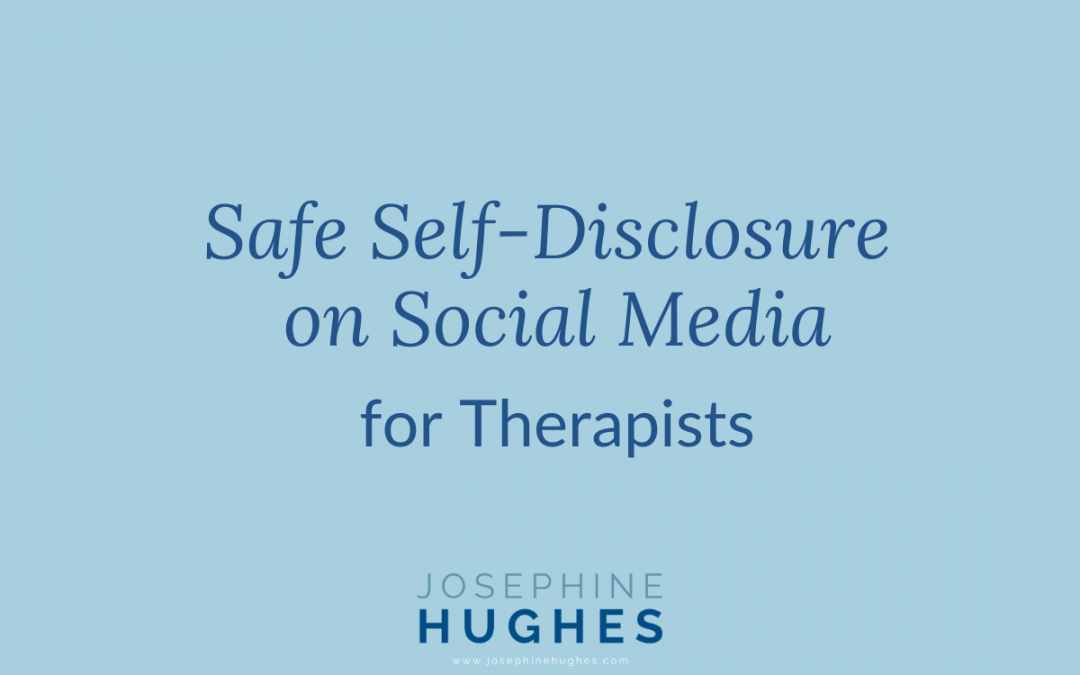Self-disclosure is one of those topics that makes many therapists nervous. In the therapy room, we’re taught to be careful about what we share – the focus should always be on the client. So when it comes to marketing via social media, it feels confusing. On the one hand, being relatable helps to attract enquiries, on the other we have to consider ethical obligations to potential clients.
So what can we share? Is it unprofessional to post a casual photo of ourselves, or to admit to our own self-doubts?
Listen to the podcast episode in full for a detailed discussion:
If you would like to subscribe to the podcast, click here.
Why self-disclosure feels scary
Therapists often worry that self-disclosure is wrong because:
- It might shift the focus away from the client.
- It could blur professional boundaries and make the relationship feel more like friendship.
- Clients might feel burdened by our story.
- We fear judgment from colleagues or criticism from strangers.
And beyond all that – self-disclosure feels vulnerable. Putting your words, your face, or your story online can feel like holding yourself open to scrutiny.
Why it matters
The truth is, clients like to know who they’ll be working with. A faceless logo or an empty profile can feel distant and unrelatable. But when you share a glimpse of yourself, it helps people feel safe enough to reach out. Transparency builds trust.
When we disclose in the therapy room, we do it for the client’s benefit. Social media can be the same. With care, self-disclosure can help clients feel less alone, and more confident that you’re someone they can talk to.
What’s safe to share
Think of disclosure in three categories:
- Professional: training, approach, values, why you became a therapist.
- Personal: small, ordinary glimpses – your dog barking at the doorbell, your messy hair, your love of walking.
- Private: the parts of your life you choose to keep for yourself.
A helpful rule of thumb for self-disclosure (listen to the podcast for a deeper explanation):
- Am I sharing my own story? Do I have permission to share?
- Why am I sharing it?
- Does my personal story still feel raw? If so, it’s best to process and reflect further before sharing.
- Would I be comfortable if a client mentioned it in session?
And one more thing that really shouldn’t need saying – but it’s important to be clear. Never share client stories online. Even if you remove identifying details, it risks breaking confidentiality and undermining trust. Social media is a place to share your own experiences, not your clients.
Start small
Self-disclosure doesn’t mean baring your soul. It could be as simple as a photo of your favourite mug, or sharing how you ground yourself with a walk outside. These little glimpses show you’re human – and that’s often enough for someone to feel they can contact you.
Explore Safe Self-Disclosure
The podcast episode suggests small, safe ways to self-disclose using examples from awareness dates in November 2025. Listen HERE for ideas.
Final Thoughts
Self-disclosure on social media doesn’t have to mean sharing your deepest secrets. It’s about choosing carefully what you show, so that potential clients can see you’re a real person as well as a professional. A simple glimpse – a photo, a small story, or an honest reflection – can make all the difference in helping someone feel safe enough to reach out.
Start small, go at your own pace, and remember: your clients aren’t looking for perfection. They’re looking for someone relatable and trustworthy. By showing just a little more of yourself online, you can build that trust before they ever step into the therapy room.
Want Support With This?
If you’d like help working out what to post and how to share safely, come and join us inside Therapy Growth Group. It’s my membership for therapists who want to grow their practice without the pressure to be perfect.
In the group you’ll find:
- Practical training and post ideas to make your marketing easier.
- Supportive coaching calls where you can get feedback on your posts.
- A community of therapists who understand the nerves and will cheer you on.
You don’t have to figure out social media alone – Therapy Growth Group gives you the encouragement and structure to grow your practice in a way that feels safe, boundaried, and doable.

